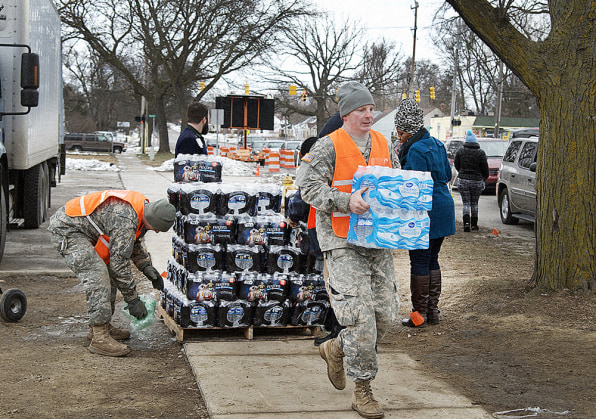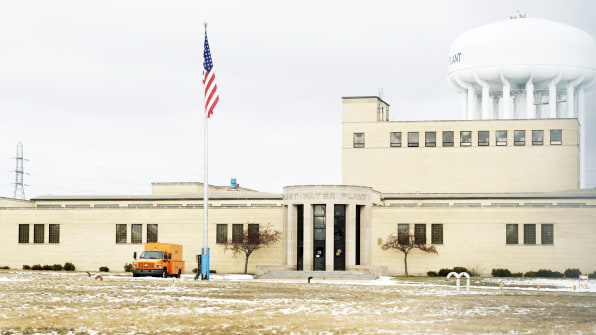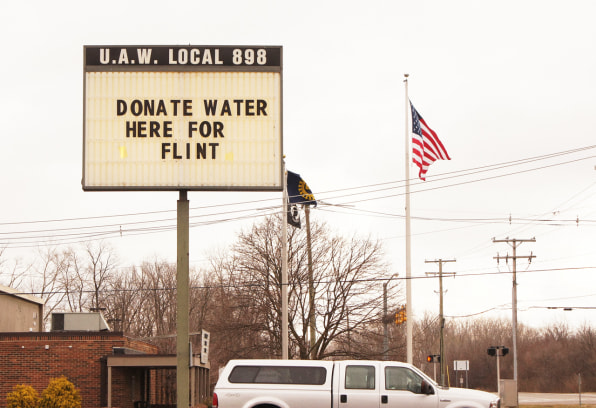How To Prevent Another Flint Water Crisis
The tragedy that is Flint, Michigan, should not be possible in the 21st century. In this time of Twitter, Facebook, and Instagram, information technology'southward inconceivable that almost no one in the world knew that 100,000 people in the United States were without clean drinking water for more than than a year. How could we then publicly fail to protect thousands of poor people of color only 10 years subsequently Hurricane Katrina? Why in the richest country in the world were at that place all the same lead pipes delivering h2o to kids despite decades-old legislation against lead in h2o, air, and more than starting in 1970? Nosotros cannot permit this to happen over again.
Here are 3 essential things we take to do to avert the next Flint:

Brand it Easier for the Poor & Disenfranchised to Use Applied science for Change
In today's hyper-connected world, awareness of injustice often spreads fast and wide. Awareness doesn't always solve problems, but information technology makes them much harder to ignore. In 2011, a tweet from Egypt's Tahrir Foursquare brought worldwide attention overnight to a brewing revolution. In 2012, 130,000 people signed an online petition in 36 hours and forced Verizon to modify its billing practices. This kind of denizen reporting merely didn't happen in Flint.
Somehow, despite the ubiquity of Twitter and sites like Change.org where you can easily tell important stories and garner support, Flint'south crisis remained largely invisible to the outside earth for over a year. I'one thousand non referring to the as outrageous fact that local and state officials knew about it and didn't human action. I'one thousand referring to the fact that the tools that can enhance awareness, create populist backlash, and apply external force per unit area on these officials were not used to exercise so.
This travesty must never exist repeated. In part, this requires the nation to prefer a modern definition for community organizing that moves beyond helping residents force per unit area elected officials through traditional ways. Nosotros need to ensure that residents, and community organizations that correspond them, are equipped with additional engagement tools and capacities that allow them to organize quickly, continually and nigh and to harness masses of people outside of their customs to assist bring well-nigh change. With billions of dollars in assets, philanthropy must also do more to drive capital to these types of technology tools. More than than lxxx% of low-income people have cell phones today. More piece of work is needed to support people in doing and so effectively.

Government Must Address Structural and Institutional Racism
Inequality goes beyond income and wealth. Inequality is also about where y'all live, what air you jiff and what h2o you drink. Historically, we've depended on government to ensure equal admission to safe air, food, and water. Yet, we are now confronted with the impacts of a 200-year legacy of discriminatory policies that drove segregation and unequal admission to opportunity for people of color and the poor.
While the blatant, Jim Crow-era laws and practices have for the most office disappeared, the insidious impact of ongoing structural and institutional racism continues. In New Orleans during Hurricane Katrina, this meant that poor people of color were disproportionally in danger of losing everything, including, in too many cases, their lives. Often, policies and approaches not necessarily adult to have a disproportionately negative affect on people of colour and neighborhoods do so in implementation. And, once in effect, these policies are often maintained despite their negative impacts.
That'south why government needs to agree a mirror up to itself. Authorities must empathize which of its laws, policies, and practices perpetuate inequity–-whether in pb and copper water pipes or access to quality early on education.
Philanthropy has a role in challenging cities to disrupt the status quo and interrogating long-standing policies and practices that might lead to inequity. There is incredible potential to implement "public sector audits"–looking at every urban center agency through a racial equity and inclusion lens to examine if their current ways of working have racially disparate results. In the wake of Flint, now is the time to ask these tough questions and double-downward on solutions that can eliminate disparities for the poor and communities of color.

Infrastructure Must exist Improved Much More Equitably
A crucial role of providing public services in a city, of course, is addressing crumbling infrastructure. Every bit a nation, we've fallen into a trap of waiting for the federal regime to gear up our infrastructure problems–and we cannot expect anymore. Increasingly, cities have to cover these costs on their own, which requires enormous coordination and new financing mechanisms to address that large and growing demand. And these costs take a toll on a city, diverting scarce resource from other critical services. Unsurprisingly, the heaviest burden and then falls on poor neighborhoods and communities of color. In many ways, this tension is at the core of the Flintstone crisis. Flint's infrastructure has failed its citizens. The current situation underscores the urgency of now, of the immediate need to come up with new and innovative means to equitably meet cities' infrastructure challenges.
Information technology is well by time for cities to develop boosted capacities to drive resources to infrastructure priorities. By smartly resourcing infrastructure, cities will be ameliorate equipped to tackle poverty, education, and chore creation. With innovative solutions, they will accept more funding to do so.
There is no question that the travesty that is Flint'due south water crunch could take been avoided. As a nation, we must come up to terms with our legacy of structural racism and leverage existing tools and solutions to dramatically ameliorate the lives of low-income residents. The systems bankrupt down in Flint. We must run across what happened in that location as both a warning and a phone call to activeness. This phone call to action is about giving citizens a bigger megaphone and supporting them in telling their stories, confronting difficult truths near systemic racism, and developing innovative solutions to build a more equitable tomorrow.
How To Prevent Another Flint Water Crisis,
Source: https://www.fastcompany.com/3057590/how-to-avoid-another-crisis-like-flint
Posted by: gentrysaughts1992.blogspot.com


0 Response to "How To Prevent Another Flint Water Crisis"
Post a Comment